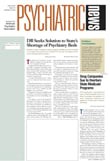How do Ugandans living in a community where HIV is rampant react psychologically to it? Two Baltimore researchers—Christopher Wilk, M.A., a research associate with the Maryland Psychiatric Research Center, and Paul Bolton, M.B.B.S., a research associate with Johns Hopkins University’s Center for International, Emergency, Disaster, and Refugee Studies—conducted a study to find out.
They were especially interested in answering the question since most HIV research in Africa related to mental health has been conducted in South Africa, but not in the other sub-Saharan countries.
And the answer, they reported in the June Journal of Nervous and Mental Diseases, is that many in the community will develop a major depression, perhaps with mood-congruent psychotic features, but not posttraumatic stress disorder (PTSD).
The Rakai and Masaka districts of southwest Uganda, with a population of about 800,000, have been severely afflicted by HIV since the early 1980s. The current prevalence rate is around 16 percent, with about three-fourths of all adult deaths attributed to HIV. So Wilk and Bolton decided to focus on these districts to learn how HIV is affecting the mental health of Ugandans living in communities with widespread HIV infection.
Fifty Ugandans in these districts were interviewed. They lived in 10 villages, reflected both sexes and various adult ages, and may or may not have had HIV infection themselves. Researchers recruited 10 World Vision staff members working in Uganda and trained them to interview the Ugandans in their native language using ethnographic interviewing techniques.
First, each of the 50 individuals was asked this question: “What are the main problems that affect the people of this community as a result of HIV?”
Problems Identified
The most frequently cited problems were poverty, increased numbers of orphans, and lack of child care. However, many persons also cited psychological problems, and those individuals were interviewed further to learn about the psychological difficulties. These individuals were also asked to name other community members who were especially knowledgeable about the subject of mental health problems stemming from HIV disease, and they were interviewed as well.
Interview results revealed that two similar, but not identical, psychological syndromes seemed to be prevalent among Rakai and Masaka villagers as a result of the HIV epidemic. They were called “Okwekubaziga” and “Yo’kwekyawa” and included symptoms such as feeling sad, feeling lonely, worrying too much, low energy, crying easily, feeling no interest in things, feeling worthless, and thoughts of killing oneself. In fact, when the symptoms of the two syndromes were pooled, they included all nine DSM-IV “A” criteria for major depression.
However, “Okwekubaziga” appeared to correspond more closely to a classic major depressive episode as defined by DSM-IV, whereas “Yo’kwekyawa” appeared to be more of a major depression with mood-congruent psychotic features. The reason is that the latter included, along with the depressive symptoms, symptoms such as “bad, criminal, or reckless behavior” and “hating the world and wanting vengeance” that may have been driven by a delusional belief system.
Neither syndrome contained any symptoms of PTSD. In fact, none of the study informants reported any symptoms specific to that disorder among their villagers.
Implications for Treatment
The results have some practical implications. For instance, Bolton is now conducting a clinical trial to determine whether group interpersonal therapy is effective in countering depression in Ugandans who live in communities where HIV infection rates are extremely high. If it is found to be effective, then World Vision Uganda will include group interpersonal psychotherapy for depression among its humanitarian aid to Ugandans, Wilk told Psychiatric News.
Also, if Ugandans are effectively treated for their HIV-provoked depression, then they might be less likely to engage in behaviors that spread HIV, Wilk and Bolton pointed out in their study report. The reason? People are more likely to engage in behaviors that spread HIV when they are depressed than when they are not, other investigators have found.
The study was part of the Complex Emergency Response and Transition Initiative, a project of the Africa Bureau of the U.S. Agency for International Development. The study was also conducted in collaboration with World Vision Uganda.
An abstract of the study, “Local Perceptions of the Mental Health Effects of the Uganda Acquired Immunodeficiency Syndrome Epidemic,” can be accessed on the Web at www.jonmd.com by clicking on “Journal Contents” and then “June 2002 issue.” ▪
